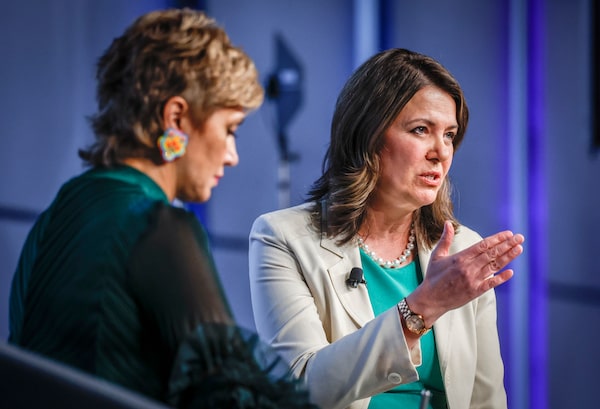
Calgary Mayor Jyoti Gondek, left, interviews Alberta Premier Danielle Smith at an economic forum in Calgary on April 18.Jeff McIntosh/The Canadian Press
The Alberta government plans to double the number of crisis response teams in Edmonton that provide support to people facing homelessness, addiction or mental illness as part of a $17-million pledge announced on Wednesday.
It follows a series of commitments made by the United Conservative Party government to address public-safety concerns ahead of what’s shaping up to be a heated election, with Alberta’s two political parties centring issues of crime and social disorder in their bid to win votes.
An official writ drop is expected in less than two weeks, followed by a May 29 vote, but campaigns are already well under way. Premier Danielle Smith and New Democratic Party Leader Rachel Notley have gone head-to-head on plans to improve public safety, both of whom are pointing to more police as part of the solution.
During a Wednesday news conference, Nicholas Milliken, Minister of Mental Health and Addiction, said the $17-million investment will support the Edmonton Police Service through the hiring of mental-health therapists to support 911 dispatch, in addition to community safety officers, paramedics, recovery coaches and health care practitioners. These new hires would work directly with people in police custody.
Nearly $4.4-million of the package is to expand HELP (Human-centred Engagement and Liaison Partnership) outreach teams in Edmonton, which is where police partner with social agencies to connect people in crisis to supports, such as housing or medical care.
A similar announcement was made last week in Calgary, where the UCP government committed $5-million over three years to expand that city’s mobile outreach teams, upgrade one of the Calgary Police Service’s arrest processing units and hire health care practitioners, paramedics and peace officers to transport and assess people detained for public intoxication.
“The increase in addiction, mental-health, homelessness and public-safety issues in our province’s capital is concerning,” said Mr. Milliken. “They deserve our help. At the same time, everyone who lives in Edmonton has the right to feel safe in their communities.”
Over the past two months, the UCP has promised 100 provincially funded police officers to Calgary and Edmonton to monitor public transit systems. Twenty-four sheriffs have also been deployed between both cities with a mandate to rein in social disorder, including open drug use, and violence.
On Sunday, the NDP outlined a plan of its own.
The party intends to hire 150 police officers across the province, in addition to 150 social workers, mental-health professionals, addiction counsellors and outreach workers, to form integrated teams that focus on “safety and support.”
It also calls for more probation officers and investment in postrelease programs to stop repeat and prolific offenders, as well as expanding a range of services, including housing, harm reduction services and addictions treatment.
As elections go, both parties have criticized the other’s platform. Public Safety Minister Mike Ellis called the NDP proposal a “half-baked announcement” and questioned the party’s ability to follow through with its promises. Meanwhile, NDP municipal affairs critic Joe Ceci slammed the UCP for its so-far muddled plans for a provincial police force.
While Mr. Milliken spoke about voluntary treatment options during Wednesday’s announcement, he faced questions on plans for involuntary treatment after The Globe and Mail revealed the government is considering what it calls the Compassionate Intervention Act. This legislation would broaden the circumstances under which people with severe drug addictions can be forced into treatment.
Mr. Milliken reiterated that the act is still under consideration but added that it would be premature to provide further details on its potential scope prior to the UCP “assessing how it actually should come into play.” He again noted that his mandate letter under Ms. Smith tasked him with exploring ways to intervene in cases where people are in the “throes of addiction.”
He said people who are overdosing five, or more, times daily are a harm to themselves and others.
Critics have said this type of law would threaten people’s Charter-protected rights and could increase the likelihood of relapse and overdose. The NDP have condemned the proposed legislation as too punitive.
 Alanna Smith
Alanna Smith